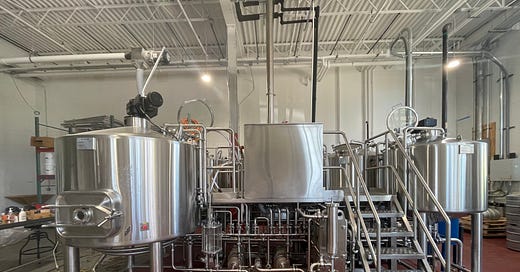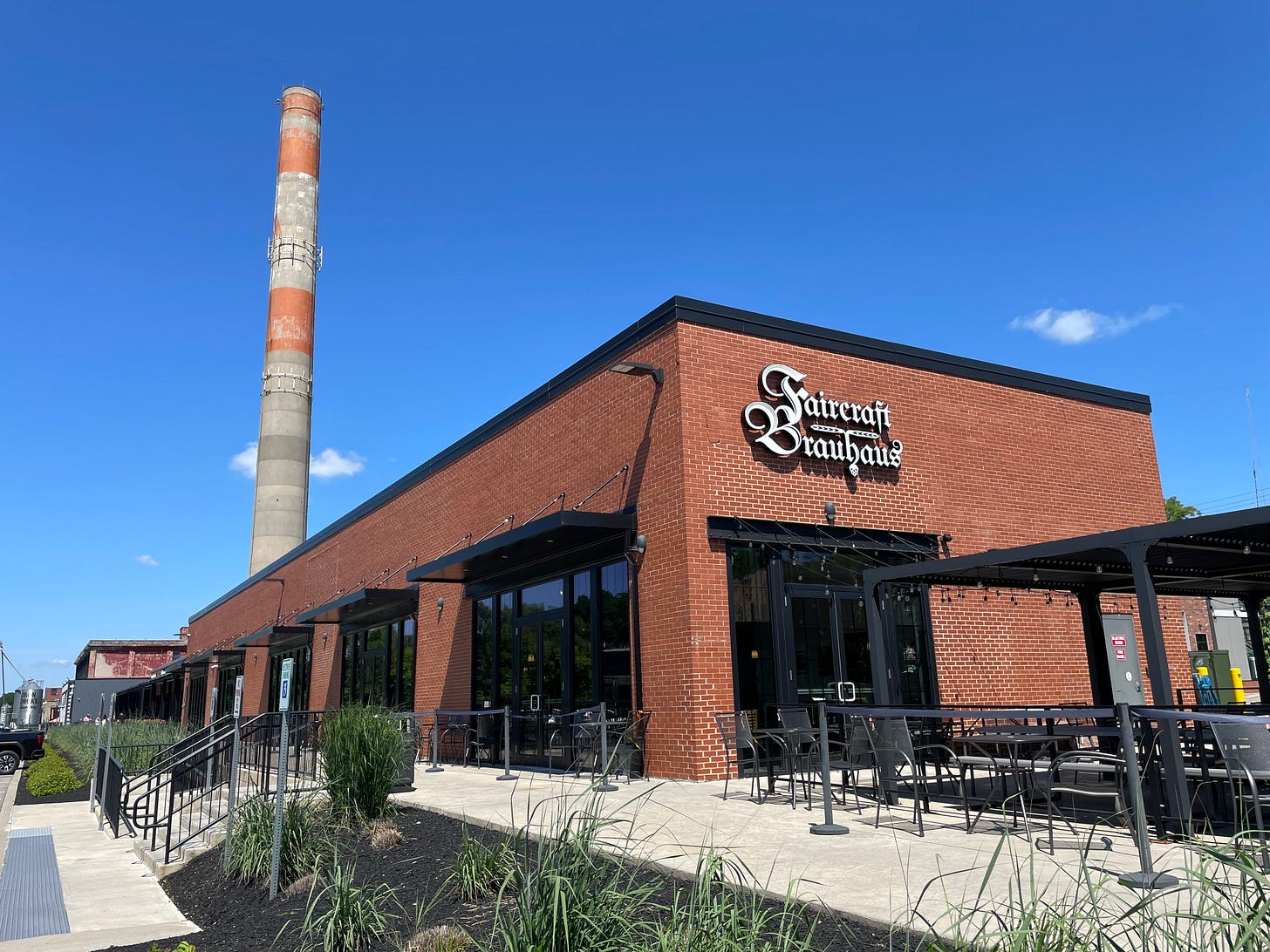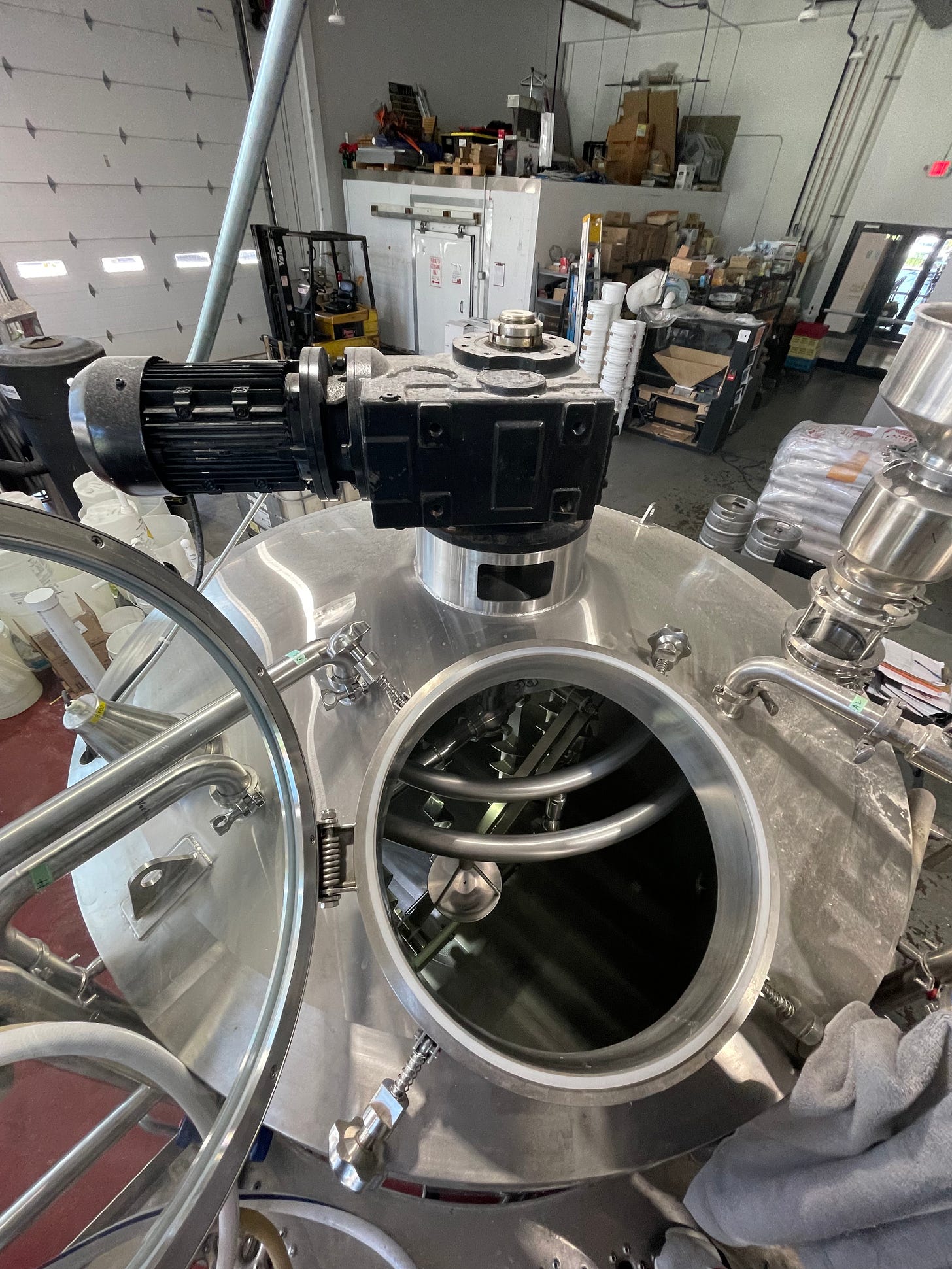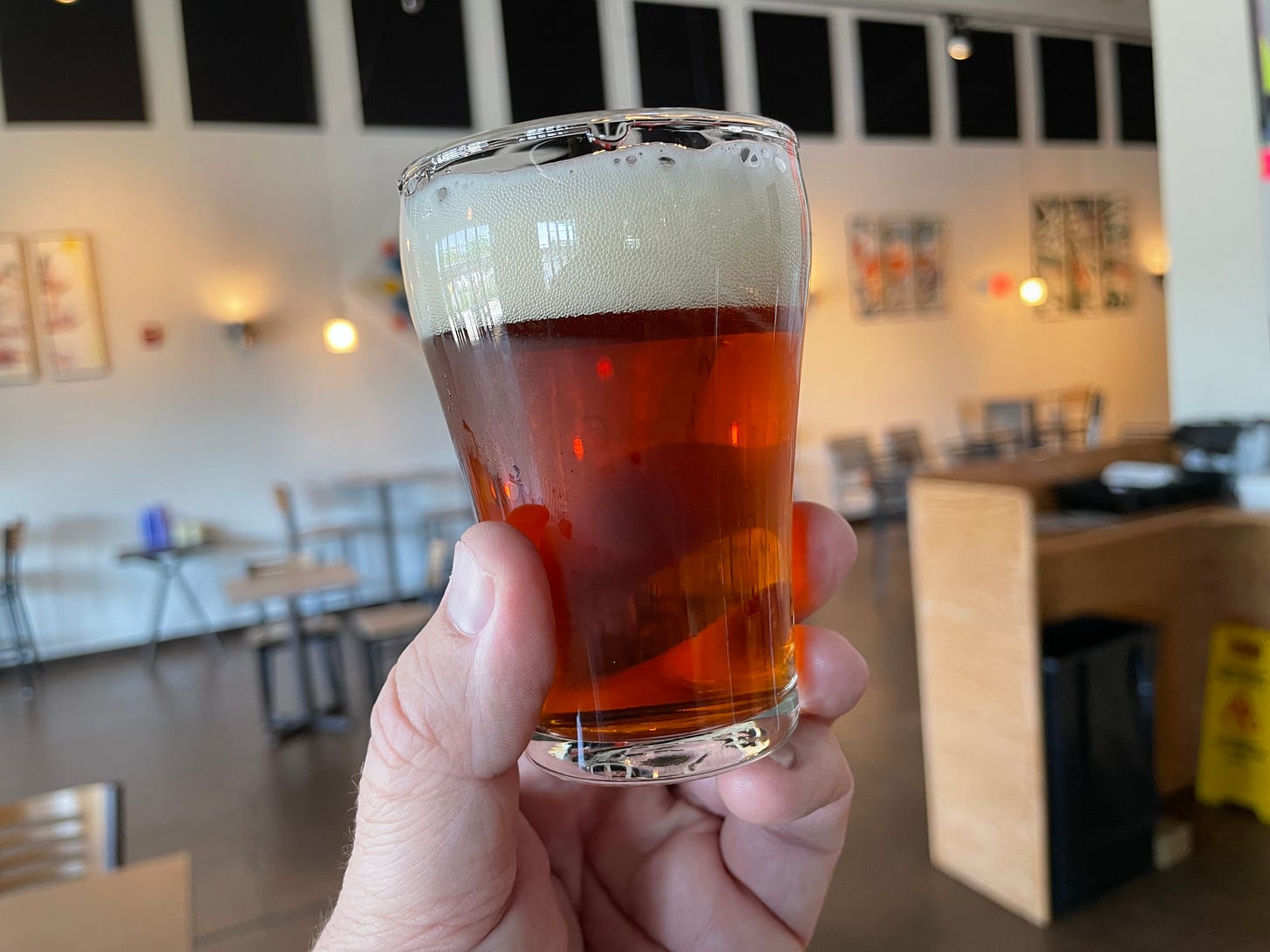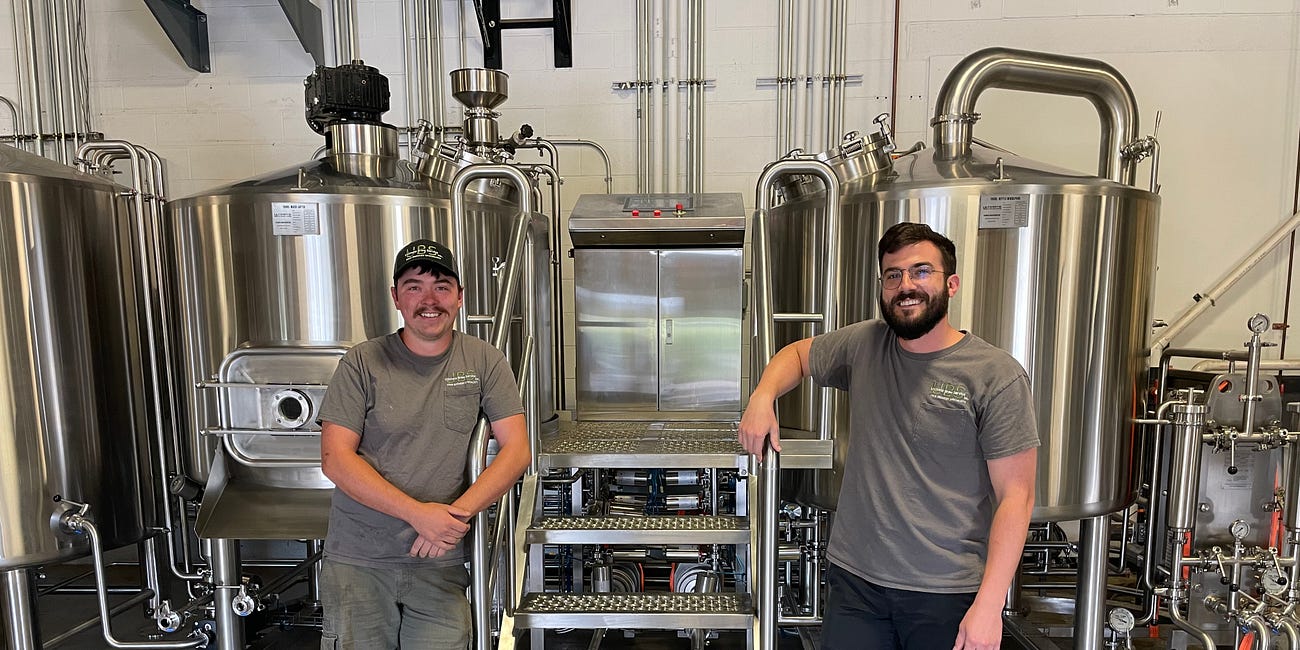Faircraft Brauhaus embraces tradition with area's first decoction brewhouse
Fairport brewery showcases traditional brewing methods in many of its lagers. Specialized equipment has made that possible.
Just a warning: This newsletter is gonna get nerdy and technical. There will be no mention of Hot Wheels, Bruce Springsteen, or hazy IPAs in this newsletter.
Steve Landgren’s enthusiasm is infectious. It’s impossible to listen to Landgren talk about beer and not get excited.
When asked about his new 10-barrel brewhouse at Faircraft Brauhaus, 25 Parce Ave. in the village of Fairport, Landgren flashes a smile and immediately dives into the intricacies of the area’s first decoction-ready system. (More on the decoction process and why Landgren is excited shortly. Promise.)
The system, which was built by Rochester-based equipment manufacturer Ultimate Brew Service, is beneficial to local beer nerds, Faircraft itself, and to UBS, which has been able to use the system as both a testing ground and a template in the construction of brewhouses for other breweries.
“It gives us a lot of technical capabilities, in terms of accuracy and process options,” brewery co-founder Matthias West said. “And with this new system, we can just do some styles better. I always compare this to sautéing. You’re taking something away. You throwing onions in boiling water and you have onion water. But if you take the onions and caramelize them and you put them in your soup, it’s different. The decoction is this thing where you can do different things to the same ingredients and get a very different outcome.”
Faircraft, which opened in early 2021 during the height of the pandemic, is not just another brewery; it's a beacon of traditional brewing techniques infused with modern sensibilities.
What is decoction brewing?
Decoction brewing is a time-honored method used primarily in traditional German and Central European brewing. It involves removing a portion of the mash (the mixture of water and malt), boiling it, and then returning it to the main mash.
“We now have systems and technology in place where we don’t need to boil a portion of the mash to raise temperature,” Landgren said. “We can do that with a jacketed mash tun. When we do it here, it’s for flavor.”
This process raises the overall temperature of the mash gradually, ensuring that different enzymes are activated at different points, which ultimately impacts the starch-to-sugar conversion. The result is a more complex, layered flavor in the final beer.
Many modern breweries have moved away from decoction due to its labor-intensive nature, longer brewing times, and brewing systems not designed or equipped to utilize this process. Instead, they often employ simpler infusion methods, where hot water is added directly to the mash to achieve the desired temperature levels. While infusion brewing is faster and more efficient, it doesn’t replicate the depth of flavor that decoction can bring. Landgren utilized an extended decoction for the brewery’s delectable Maibock. He also uses decoction on his Hefeweizen, Marzen, and a few other lagers.
Recently, we’ve seen a resurgence of craft-brewed lagers that showcase decoction and proudly trumpet the process on the beer label. That includes breweries like Grimm Artisanal Ales, Human Robot, Jack’s Abby, and many more.)
Why decoction?
Faircraft Brauhaus embraces the decoction method, despite its complexity, because it values the traditional craftsmanship of brewing. By investing in a decoction-ready system, Landgren and Faircraft equipped itself to create beers with a fuller body, richer malt flavors, and a distinct mouthfeel. This is a crucial differentiator.
Styles like Märzens, bocks, and Helles lagers depend heavily on the intricate flavors of malt, and decoction brewing brings out caramel, toasty, and bready notes that would otherwise be muted in infusion-brewed versions.
“It really does allow the wheat, the barley, and the other malts in there to blend so nicely together and pulls out a little more malt richness,” Landgren said. “The place smells like a bakery when you’re back there (in the separate brewing space). It’s a lot of fun.”
Faircraft’s use of decoction brewing aligns with this growing demand for authenticity and craftsmanship. While many breweries may tout their hop profiles or experiment with wild ingredients, fewer focus on the subtleties of malt, which is where decoction brewing excels.
The system
Landgren and Faircraft originally utilized a 3.5-barrel brewing system that they obtained from a brewery in Pittsburgh. (That brewhouse is still at Faircraft and is used for smaller pilot batches.) But Landgren and brewery co-owners West and Jeff Reimer knew they wanted to continue to showcase traditional beer styles, particularly those from the German school of brewing. Therefore, the decision to upgrade the brewhouse didn’t prove to be a particularly difficult one.
“The size of the vessel, the placement of the ports on the mash tun, those are all things we needed to consider,” Landgren said.
Faircraft needed a sturdy pump to move grain-filled liquid between the decoction vessel and the main mash tun. Other factors needed to be considered, too. But one thing that didn’t need to be considered was the decision about who Faircraft would work with to construct the system. Despite not constructing Faircraft’s original brewhouse, Landgren and company worked closely with Chris Brogan and his team at UBS to install, modify, and perfect the placement and operation of the system.
“They had designs. They showed us how far up we want these ports to be, what’s the volume of your decoction, so we figured we would need something that could handle at least a third of the mash,” Landgren said. For the steam-powered 10-barrel brewhouse, Landgren said it can handle about 12-13 barrels of total grist, making the decoction vessel (also known as a mash cooker) about 5 barrels. The vessel can also be used for other things like the pre-conditioning of the water.
Since grain and water are constantly boiling, they needed to make sure they didn’t burn the mash. “They installed a rotor that stirs constantly,” Landgren said.
West said it was really a partnership between UBS and Faircraft.
“We really designed this system together based on Steve’s wishes,” West added. “That’s really what it boils down, too. Chris Brogan is a really good engineer and he’s a really good welder. He learned HVAC and refrigeration from his grandfather. So Chris was a guy I had a good relationship with and we discussed designs of pumps.
“He listened very carefully to what Steve really wanted as an ideal brewing setup.”
Brogan said there were two months of planning and design before they were ready to fabricate the system. Landgren was able to describe exactly what he wanted and the UBS team was able to alter its 3D model to mirror those desires.
“It was very fun and challenging, at times,” Brogan said. “But overall, we’re really happy with how it turned out. The biggest issue for us was just designing and engineering the piping and the pumping, basically the moving of that liquid. You can’t use the traditional pumps people use on brewhouses to move that kind of stuff.”
The results
Faircraft’s decoction-brewed beers are known for their well-rounded, robust malt character. The longer brewing process allows the malt flavors to fully develop, resulting in beers that are smooth, balanced, and have a lingering finish. For example, the brewery’s Märzen has a toasted, slightly sweet malt backbone with a dry finish, making it an ideal beer for fall festivals or pairing with hearty meals.
Faircraft’s dedication to decoction brewing showcases a passion for quality and tradition. Paying attention to those small details translates into better beers. And that ultimately benefits consumers, because it aids in both education and appreciation. In a world where many breweries are cutting corners for speed, Faircraft has chosen to honor the time-tested methods that have made European lagers some of the most beloved beer styles in history.
Wholly unrelated to the decoction, I would be remiss if I didn’t plug Faircraft’s Friday firkin every week. The Fairport brewery is one of the few spots in the area still featuring cask beer. At 4 p.m. every Friday, Faircraft taps a cask of one of its beers and it often features some special ingredient, additive, adjunct, or hop.
Heartily recommended.
From cows to hops: Homegrown manufacturer bridges the gap between dairies and breweries
Chris Brogan remembers those nights he would get woken up by the buzz of his phone. Often, it was a farmer asking him to hurry off to the farm to repair some dairy equipment. Now that he has his own business, those calls don’t come any more.
A final note: It’s pretty wild to think I’ve been working on this independent publication for over two years now. In that time, I’ve published 200 newsletters, highlighted some of my favorite people in the industry, curated two beers festivals (that featured 150 participants and 4,600 attendees), and continued to break all the biggest news in the region (closures, consolidations, openings, etc.).
The Cleveland Prost remains the preeminent source for regional beer news. If you own a brewery, bar, or beer-adjacent business, this is the best place to reach the nerds you wanna be in front of. So I remain open to sponsorships, advertisements, and sponsored content. Feel free to reach out to me at clevelandprost@gmail.com for more. And more than anything, thanks for all the support. None of this would be possible without the devoted (and thirsty) audience.

